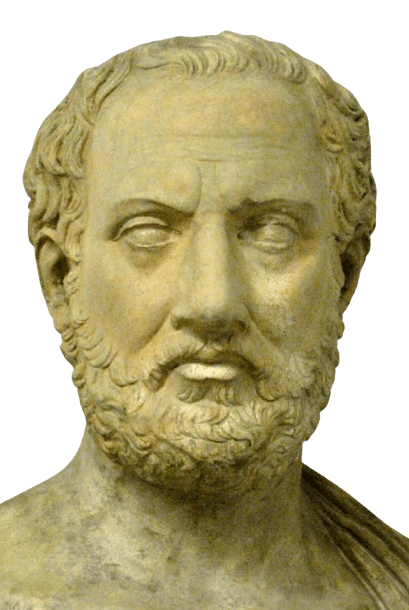Life and achievements
Early life
Thucydides was born around 460 BC in Halimous, Athens, into a family of considerable means. His father, Olorus, was of Thracian descent, a lineage that connected Thucydides to the Thracian royal family. This connection, along with their ownership of gold mines in Thrace, ensured the family's wealth and influence. Little is known about his early education, but it is believed that he was well-versed in the traditions and intellectual pursuits of Athens.
As a young man, Thucydides likely witnessed the rise of Athenian power and the burgeoning tensions that would lead to the Peloponnesian War. His early exposure to these dynamics may have sparked his interest in political and military affairs. His family's affluence provided him the opportunity to travel and observe different cultures and political systems, experiences that would later inform his historical work.
Thucydides' early life was marked by his participation in the military. He was involved in the Samian Revolt and other conflicts that showcased his strategic acumen and understanding of warfare. These experiences, combined with his intellectual background, set the stage for his future role as a historian and general.
Legacy
Thucydides' legacy is defined by his groundbreaking approach to historical writing and political analysis. His "History of the Peloponnesian War" remains a seminal work, offering a meticulous account of the conflict between Athens and Sparta. His emphasis on empirical evidence and cause-and-effect analysis established new standards for historical methodology, earning him the title of the father of "scientific history."
Thucydides' work transcends mere historical recounting; it delves into the complexities of human nature and political power. His insights into fear, self-interest, and the interplay of power dynamics continue to resonate in modern political science and international relations. The Melian Dialogue, a part of his history, is particularly notable for its stark portrayal of power politics and ethical considerations in wartime.
His influence extends beyond academia. Military colleges and universities worldwide study his work to understand strategic thinking and leadership. Thucydides' ability to capture the essence of political and social crises has made his work timeless. His legacy endures as a touchstone for those seeking to understand the fundamental drivers of human behavior and the intricacies of political power.
Milestone moments
Jul 10, 460
Birth of Thucydides
Thucydides was born around 460 BC in Halimous, Athens. His father, Olorus, was of Thracian descent, which connected Thucydides to the Thracian royal family.
His family's wealth came from gold mines in Thrace, providing them with significant influence and resources.
Thucydides' early life in a prosperous and politically active environment likely shaped his future interests in history and politics.
Aug 1, 429
Survives the Athenian Plague
Thucydides lived through the devastating plague that struck Athens during the early years of the Peloponnesian War. This plague claimed the lives of many, including the influential statesman Pericles.
Thucydides' survival and firsthand experience of the plague informed his detailed account of the event in his historical work.
This period also highlighted his observation skills and his commitment to recording events with accuracy and detail.
May 16, 424
Command at Amphipolis and Exile
Thucydides was appointed as a general and sent to Thasos. During the winter, the Spartan general Brasidas captured Amphipolis, an important Athenian city.
Thucydides' failure to reach the city in time led to his exile, a punishment that provided him with the freedom to gather information from both sides of the conflict.
This period of exile was pivotal, allowing him to dedicate his time to writing his history and conducting in-depth research.
Dec 11, 411
Completion of "History of the Peloponnesian War"
Thucydides' narrative of the Peloponnesian War concludes in 411 BC, leaving the work unfinished. His detailed account remains one of the most important historical records of the period.
The work is praised for its rigorous methodology, analytical depth, and the author's commitment to factual accuracy.
Thucydides' history set new standards for historical writing and remains a crucial text for understanding ancient Greek history and political thought.
